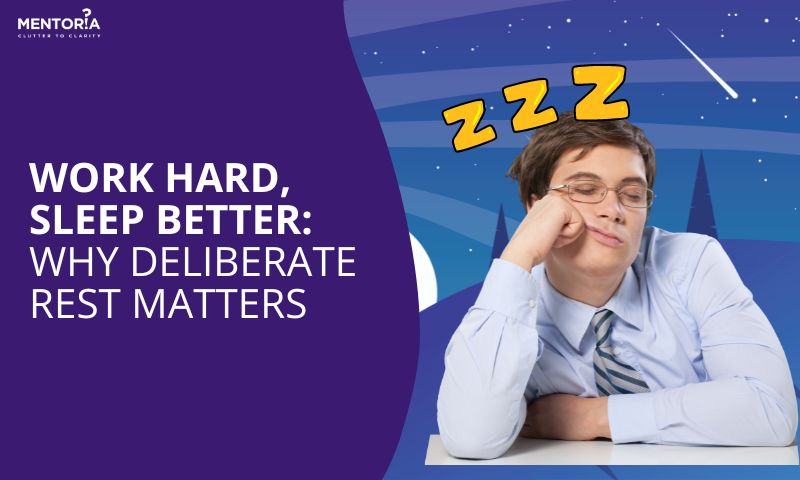Work Hard, Sleep Better: Why Deliberate Rest Matters

In the hustle and bustle of professional life, time is a precious currency. The notion of intentional rest might seem counterintuitive, but as we navigate work’s demands, it becomes clear—deliberate rest isn’t a luxury; it’s the catalyst for peak performance. In this blog, we dive into the art and science of downtime, unveiling seven ways deliberate rest can be your go-to. In a world that never hits pause, discover why strategically hitting the brakes might just be the key to achieving sustained excellence in your professional journey.
Benefits Of Deliberate Rest
Resetting The Mind And Body
In the demanding landscape of working professionals, resetting the mind and body is akin to a power nap for your brain. Deliberate rest isn’t a luxury; it’s a necessity. Short breaks throughout the day have been proven to enhance focus and productivity. Think of it as a mental breather – stepping back momentarily to recalibrate allows you to approach tasks with renewed energy and a clearer perspective. It’s a simple yet effective strategy to prevent burnout and maintain a sustainable pace in the professional marathon.
- Micro-breaks: Take short breaks throughout the day, even if it’s just a five-minute walk or a moment of deep breathing.
- Change of Environment: Step away from your desk. A change of scenery, even briefly, can do wonders for resetting your focus.
- Mindful Pause: Practise mindfulness or meditation during breaks to clear mental clutter and enhance mental clarity.
- Hydration Breaks: Use breaks to hydrate. Dehydration can impact cognitive function, and a quick sip of water can make a significant difference.
- Stretching Exercises: Incorporate simple stretching exercises to release physical tension and invigorate your body.
Decoding The 10,000-Hour Rule
The 10,000-hour rule emphasises extensive practice for mastery, but it often overlooks the role of rest in the learning process. Deliberate rest complements this rule by recognising that the quality of practice surpasses sheer quantity. Strategic breaks aid in information retention and skill mastery. Rather than relentless practice, incorporating focused downtime enhances the efficiency of learning and contributes to long-term expertise. Deliberate rest becomes the missing piece in the mastery puzzle, ensuring a more balanced and effective approach to professional development.
- Quality Practice: Focus on the quality of practice rather than sheer quantity. Break your practice sessions into focused, intentional intervals.
- Interleaved Learning: Mix up the skills or subjects you’re practising to promote a more profound understanding and retention.
- Spaced Repetition: Space out your practice sessions over time to enhance long-term memory and skill retention.
- Reflective Practice: Take breaks to reflect on your learning. It’s during rest that your brain consolidates information.
- Balanced Practice: Incorporate rest breaks within your practice routine to avoid burnout and maintain a sustainable learning pace.
Defining Clear Parameters For Rest
Deliberate rest isn’t about aimlessly passing time; it involves setting clear parameters for purposeful downtime. Engaging in activities like reading, walking, or mindfulness within defined time frames ensures that your rest is intentional and contributes positively to your well-being. By establishing boundaries, you create a framework that transforms rest into a meaningful and rejuvenating experience. It’s about breaking away from the chaos of work without falling into the trap of unproductive idleness. Clear parameters guide you to a restful space that nurtures your mind and body, fostering a healthy balance between work and leisure.
- Set Time Limits: Allocate specific time slots for restful activities, ensuring that your downtime remains purposeful.
- Device-Free Zones: Designate areas or times where digital devices are off-limits, fostering a more restful environment.
- Define Restful Activities: Clearly identify what activities bring you relaxation, whether it’s reading, taking a walk, or practising a hobby.
- Consistent Bedtime: Establish a consistent bedtime routine, promoting restful sleep and overall well-being.
- Create a Restful Space: Designate a comfortable and quiet space for rest, away from the noise and demands of work.
The Power Of Routine
Deliberate rest isn’t an occasional thing; it’s a routine that becomes a cornerstone of your daily life. Intentionally integrating breaks into your routine transforms them from reactive responses to proactive necessities. Research underscores the benefits of establishing a rest routine, showcasing reduced stress and increased job satisfaction. By making rest an integral part of your daily rhythm, you cultivate a sustainable and enjoyable professional journey. It’s not about waiting for burnout to hit; it’s about weaving moments of intentional rest into the fabric of your routine, ensuring a more balanced and fulfilling work-life dynamic.
- Scheduled Breaks: Incorporate scheduled breaks into your daily routine, avoiding the temptation to skip them.
- Consistent Wake-Up Time: Maintain a consistent wake-up time, promoting a regulated sleep-wake cycle.
- Mealtime Rituals: Create rituals around mealtimes, turning them into moments of relaxation and enjoyment.
- Mindful Commute: If possible, turn your commute into a mindful activity, whether it’s listening to calming music or practising gratitude.
- Evening Wind-Down: Develop an evening routine that signals to your body and mind that it’s time to wind down and prepare for rest.
Deliberate Rest Is Active
Contrary to the misconception that rest equates to idleness, deliberate rest is an active engagement with rejuvenating activities. It involves participating in endeavours that replenish your energy, whether it’s pursuing a hobby, spending quality time with loved ones, or engaging in recreational sports. Active rest is a deliberate choice to invest your downtime in activities that contribute positively to your physical and mental well-being. It’s about recognising the importance of purposeful engagement during breaks, ensuring that you return to work not just rested but invigorated and ready to tackle challenges with renewed enthusiasm.
- Engage in Hobbies: Pursue hobbies that you genuinely enjoy, whether it’s painting, gardening, or playing a musical instrument.
- Quality Social Time: Spend active, quality time with friends and family, fostering meaningful connections.
- Recreational Sports: Incorporate sports or physical activities that bring joy and vitality into your routine.
- Learning New Skills: Use your downtime to learn a new skill or engage in activities that challenge and stimulate your mind.
- Mindful Activities: Choose activities that engage your mind actively, such as solving puzzles or practising mindfulness meditation.
Balancing Work And Life As Equal Partners
Traditional Work-life balance often implies a seesaw, where one side’s gain results in the other’s loss. Deliberate rest introduces a paradigm shift, positioning work and life as equal partners in a harmonious dance. It’s a recognition that success isn’t solely measured by professional achievements but also by overall well-being. By embracing both work and life as integral components of a unified whole, professionals can foster a healthier and more sustainable approach to their careers. It’s about finding equilibrium, where both aspects complement each other, leading to enhanced job satisfaction and a more fulfilling personal and professional life.
- Set Boundaries: Establish clear boundaries between work and personal life to prevent one from encroaching on the other.
- Prioritise Self-Care: Make self-care a non-negotiable part of your routine, whether it’s exercise, reading, or spending time in nature.
- Quality Family Time: Allocate dedicated time for your family, ensuring that work commitments don’t overshadow personal relationships.
- Unplugged Weekends: Consider weekends as sacred time to disconnect from work-related activities and focus on personal enjoyment.
- Regular Check-Ins: Periodically assess your work-life balance, making adjustments when needed to maintain equilibrium.
Embracing The Whole Picture
Deliberate rest encourages professionals to view success through a holistic lens, encompassing not just career achievements but overall well-being. It’s an acknowledgment that thriving in the professional realm is interconnected with mental and emotional health. Studies indicate that professionals who prioritise deliberate rest experience greater job satisfaction, improved mental health, and are more likely to sustain long-term success. By understanding that success extends beyond the confines of career achievements, individuals can create a fulfilling and sustainable life. Deliberate rest becomes the cornerstone of a holistic approach, ensuring that both personal and professional aspects thrive in harmony.
- Holistic Goal Setting: Set goals that encompass both professional and personal aspects of your life, ensuring a balanced pursuit of success.
- Regular Health Check-Ups: Prioritise your health by scheduling regular check-ups and taking preventive measures.
- Continuous Learning: Embrace learning not just in your career but also in areas that contribute to your personal growth and well-being.
- Meaningful Relationships: Cultivate and invest in meaningful relationships, recognising their vital role in overall happiness.
- Mind-Body Connection: Acknowledge the intricate connection between mental and physical well-being, nurturing both aspects for holistic health.
Unlocking High Performance Through Deliberate Rest
In the relentless pursuit of success, deliberate rest emerges as a powerful ally, not a hindrance. By acknowledging the significance of intentional breaks, professionals can tap into a wellspring of productivity, creativity, and overall job satisfaction. So, let deliberate rest be the compass guiding you towards sustained high performance. It’s not about working harder; it’s about working smarter by understanding the profound impact of purposeful downtime on your professional journey.
We’re here to provide you with all the help! Kick-start your journey with Mentoria and discover the right fit for you. Feel free to call us to speak to our career mentors and choose the right guidance plan that suits your needs. Mentoria’s career guidance programme enables you to choose your perfect fit from 3 streams, 850+ courses, and 12,000+ careers, and discover what will bring out the best in you.
Mentoria, with its wealth of experience and commitment to your corporate’s growth, is here to be your trusted guide. We specialise in helping individuals just like you set meaningful goals, build actionable plans, and achieve their dreams. By partnering with Mentoria, you can supercharge your path to success, and that starts with giving your employees the nurturing they need.









